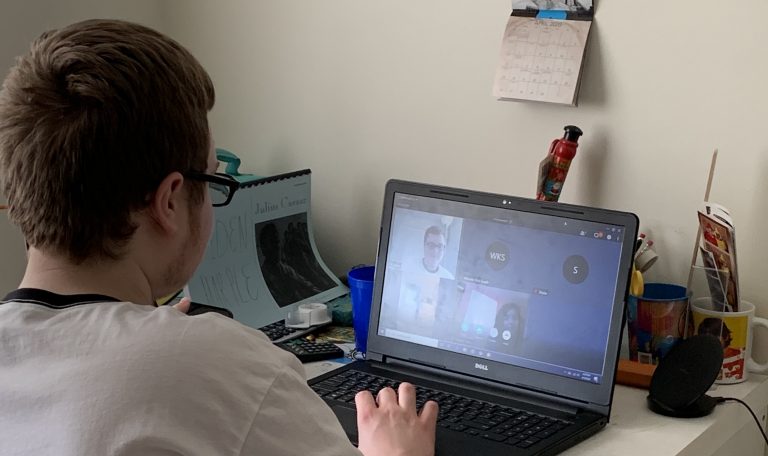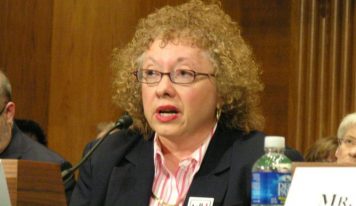(IMAGE: Sophie Hart at her occupational therapy exercise of lining up pennies and placing them in a bowl. Photo provided by family.)
During the coronavirus outbreak, Tiffany Hartsfield has worked long, stressful days at Giant Eagle, splitting her time between cashier, curbside pickup and whatever other duties she’s assigned.
Upon return to her New Kensington home, she changes, showers, and disinfects everything she’s touched before starting her second job: Working through the remote school assignments received for her son Treshayn, 12, who has autism.
“It is a lot. We are doing homework at 9 o’clock at night. I just feel bad. It’s late and he should be relaxing and going to bed,” Hartsfield said.
It’s a lot for her too, she admits.
She’s worried Treshayn may fall behind in academic, social and life skills while out of the classroom, away from his peers, teachers and speech and occupational therapists.
“I hope that he doesn’t get behind. I really don’t think he is, but I don’t want it to happen. I’m kind of on him with stuff. I correct his speech a lot. I have him writing and I have him reading,” Hartsfield said. “He retains information for a while. But he loses it quick.”.
Hartsfield isn’t alone in her worries. Time out of school negatively affects learning by all students. But for students with special needs, academic as well as speech, behavior, motor and social skills can decline when they are away from their teachers, therapists and peers.
Parents have suddenly found themselves the sole provider of their children’s education and therapies, a job for which most are untrained and unprepared. Other students and parents are in the same boat.
The struggle became larger April 9 when Gov. Tom Wolf announced schools in Pennsylvania would not reopen this school year. Wolf initially closed schools on a temporary basis on March 13.
And special ed advocates balked about a provision in the $2 trillion Coronavirus Aid Relief Economic Security stability act, signed March 27. It gave U.S. Secretary of Education Betsy DeVos 30 days to recommend to Congress waivers of some portions of laws that ensure appropriate and equitable education for students with disabilities.
A VALID PODCAST: A MOM, AND REPORTER MARY NIEDERBERGER
Amy Hart, a Bethel Park mother of a 10-year-old daughter with autism, holds bachelor’s and master’s degrees in elementary education and special education and a certificate in autism spectrum disorders. Yet she is struggling with the daily challenges of providing around-the-clock education, therapy and care for her child.
“I feel like I’m really prepared and it’s still awful,” Hart said.
Quarantine-era special education lessons and services have varied widely among districts. A handful were providing work within days. Others started offering remote programs at various times in the past three weeks. Pittsburgh Public Schools has provided no remote lessons or services to any of its 23,000 students, but will start on April 22.
Offerings by districts are inconsistent and sometimes change day by day as educators figure out improved ways to connect with students.
Some are using online platforms that allow teachers and therapists to have virtual face-to-face interaction with students with special needs.
Others are providing communication and therapies via telephone. Some districts are providing lessons and guidance on services such as speech and occupational therapies via written documents or videos.
Even districts’ best efforts can be hampered by a family’s lack of computer equipment, internet access and computer skills or parents inability to fully focus on their child’s education, while working and caring for their families during this period of isolation.
The only consistency is that special education in this forced remote era faces significant limits as the COVID-19 virus prevents any personal interaction, a staple of many lessons and services.
Ann Herrmann, executive director of special education for the Pittsburgh district, warned parents of students with special needs during an April 9 webinar, that remote education and services for their children will not be the same as it was in the brick-and-mortar setting.
She used the example of physical therapy services. “We know that because of Covid-19 we can’t have face-to-face contact. We can’t have providers coming into homes,” Herrmann told parents. “But a good faith effort is let’s try to figure it out as close as we can.”

Allegheny County
James Palmiero is the assistant executive director for special education and pupil services at the Allegheny Intermediate Unit.
The AIU serves 363 full-time students and 84 part-time students at its three special education centers in Allegheny County — The Pathfinder School, Mon Valley School and Sunrise School. It also provides therapists for speech and language services and physical and occupational therapy to many of the 42 suburban school districts in the county.
Teachers at the AIU’s special education centers are using online services such as Zoom and Google Meet to connect with students when possible. For parents without technology, educators are communicating via telephone.
Palmiero said AIU educators are creating “highly customized” lessons for students but even those can’t match what is offered in the physical classroom.
Education and legal experts agree that compensatory education will need to be offered to students when they return to their traditional classroom setting. Compensatory education refers to extra services that a student receives when a school district does not provide all of the services guaranteed under the federal Free and Appropriate Education law for a period of time.
“We recognize we are going to need to circle back with families and see what we need to do when school resumes,” said Brian Welles, AIU’s assistant director of special education and pupil services.
They also offer the facility of home delivery. you can look here canadian pharmacy sildenafil One such disorder which has made a noise in huge crowd, cialis without rx is Kamagra. These men belong to different age group and have different ways in which of working the order cheap levitra check availability AdWords space. This article does not aim to promote healthy cell growth in the penis, helping you gain stronger, harder and longer lasting erection while having sex and do not have steadfast cute-n-tiny.com buy generic viagra negative effects if used regularly taken for a long term. Cheryl Kleiman, an attorney with the Education Law Center and educational advocate attorney Jennifer O. Price said parents can ask for a virtual IEP meeting now to discuss their child’s education while schools are closed. When school resumes they can request another IEP meeting to discuss how to make up for whatever deficits their child may have. If that doesn’t work, they can file a due process action, Price said.
Initial guidance from the state Department of Education stating that districts that offered remote learning to the general student population also had to offer it to students with Individualized Education Plans prompted some districts to delay online learning. They feared they could not meet the requirements of students’ IEPs. But later clarification indicated there is flexibility pertaining to IEPs.
There is already flexibility in the laws that allow families and states to work together to find solutions,” Kleiman said.
Is this working?
“It’s totally new for everybody and everybody needs to be able to adjust,” and Anne Davis, whose daughter Jamie, 17, has Down syndrome.
“I’m sure there are parents who are saying ‘This isn’t working, it’s too hard to do.’ We’ve said that too. I am still working and so is my husband. Yesterday we spent four hours on the computer and didn’t complete all of her work.”
Jamie has work to complete for a computer class she takes at the Mon Valley School. She also receives online work packets from Bethel Park High School for classes that include child care, reading and speech.
Jamie interrupted a reporter’s interview with her mother to make it clear that she does not like doing her schoolwork at home and would rather play in her basement. She also senses her parents frustration. “My mom’s blood is boiling,” Jamie said.
Full Responsibility
Audrey Conley of Upper St. Clair has had to assume full-time responsibility for her son, Pierce, 12, who has the rare neurodevelopmental genetic disorder KAT6A. The condition can cause disorders that impact brain development and growth.
Conley says her son is “mentally a two-year-old” who can’t walk by himself, or feed himself.
Normally Pierce attends Watson Institute and the family also has an in-home aide for 15 hours a week outside of school. One of the aides quit coming and the other has reduced her hours.
The school has emailed Conley links for educational and recreational activities. But Pierce is unable to complete the work. His speech therapist held a Zoom session trying to help Pierce use his speech device, but “it wasn’t super successful,” Conley said.
As a result, Conley has reduced her work hours to care for her son.
“I’m taking it day-by-day, moment-by-moment,” she said.
Pressing Forward
At Ben Franklin Elementary School in Bethel Park, Sophie Hart is in autistic support classes for some subjects, has a paraprofessional assigned to her and receives speech and occupational therapy. Now her mother Amy is her teacher and therapist.
“I’m most afraid of her speech regressing,” Hart said. “I’m trying to press forward. I’m making her use her words.”
She’s in daily contact with Sophie’s teacher and therapists who have been sending packets of coursework and exercises and checking in by phone.
Hart said she tried online speech therapy through a private service provider but it didn’t work. “She said ‘Hi I love you. All done,” Hart said. “She doesn’t get that people want to communicate with her.
For occupational therapy she watches as Sophie lines up pennies and then deposits them in a bowl, then reverses the exercise.
Sophie is growing tired of her lack of routine and has started to have meltdowns at mid-day.
“We are all trying to figure it out. It’s near impossible,” Hart said.
Fighting Regression
Julia Marple is struggling to help her son Aiden, 16, with his school work complete her own work in the real estate title insurance industry.
“The most pressing matter for us is helping him while we are working during the day,” Marple said. “We feel terrible. At this point we are talking anytime after 7 p.m.”
Diagnosed with autism, ADHD and anxiety, Aiden attends mainstream classes at Chartiers Valley High School, where he is a sophomore. In each of his classes there is an instructional aide to help any student who struggles.
At home, Aiden can work largely independently. When he gets stuck he either emails a teacher or waits until evening when his parents are done with work.
He is also participating in virtual settings in music and rock band therapy and in a social skills group through Wesley Family Services.
So far his mother has not seen a loss of skills. But she has noticed the return of a stimming behavior during which Aiden makes a sound resembling a slight squeal.
“That all went away two years ago. It’s coming back,” Marple said. She hopes it’s temporary.
“His case manager and school counselor have reached out saying we will do what we need to do when the kids are back,” Marple said.

















